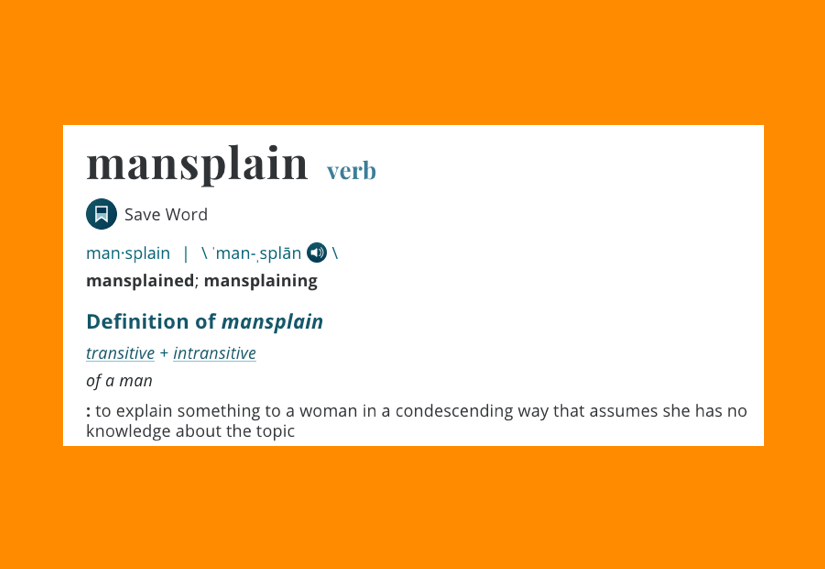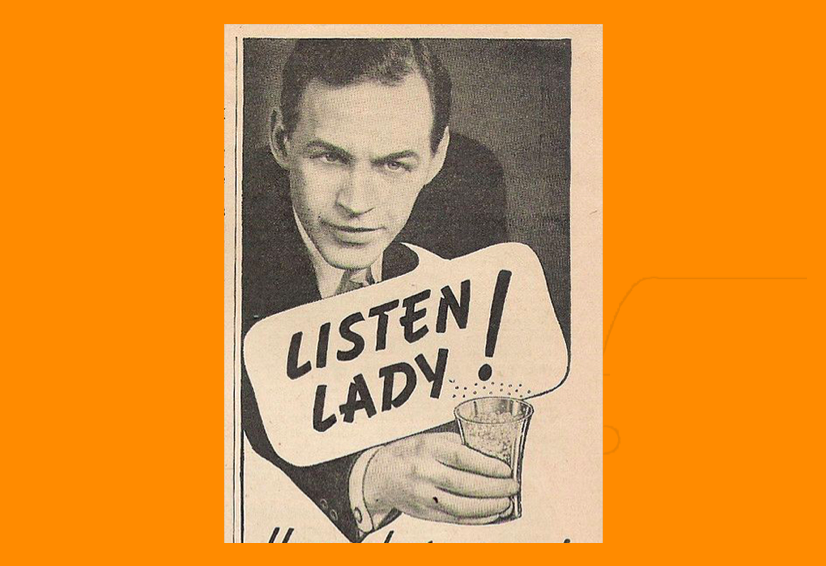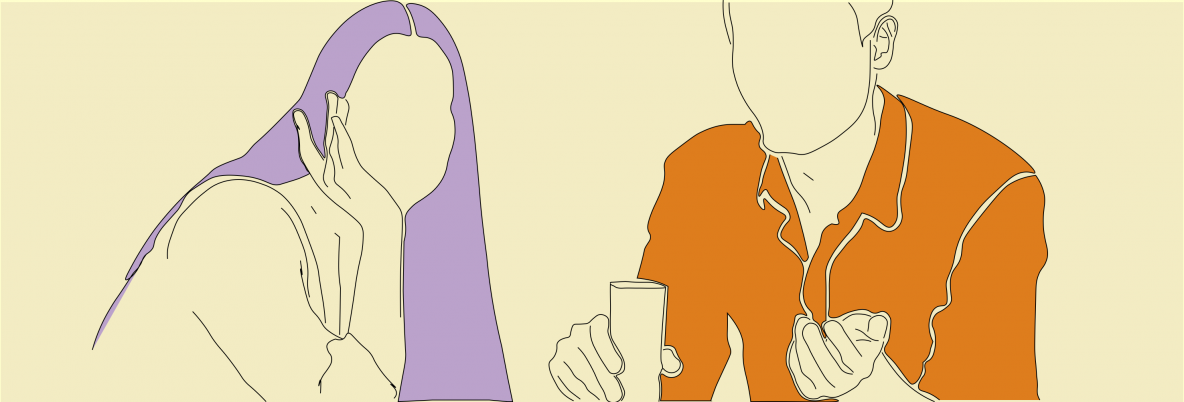whY I'M TIRED OF DISCUSSING FEMINISM WITH MEN
By Annabel White / 29 August 2020

Illustration by Lena Blacker
Although a recent encounter with a coworker was the motivation behind it, this piece is by no means a personal attack. Rather, it is an expression of frustration towards the symptomatic patriarchal structures that enable and encourage belittling attitudes towards women.
A lot of the microaggressions are unintentional. And as a result, a lot of the frustrations felt by women are brushed off. I don't think the man who motivated me to write this was aware of the effect that our conversation had on me at the time (although he is now). The goal is education, not alienation. Read on as you wish.
This is how it started.
We are having some drinks in the square after work. We're in a suburb of West Tokyo, which is where we work as English teachers. The state of emergency was lifted here in early June hence the working (and the drinking). We are talking about music, the online magazine he's thinking of starting, whether he's a gen Z or a millennial, whether I'm a gen Z or a millennial and then coronavirus. The conversation is interesting and no one's getting offended. Yet.
And then we do that thing white liberals love to do once they've had a few drinks; we start talking about politics. In some ways, what happened next was my doing. I was the one who mentioned the success that the countries with female leaders have had at tackling coronavirus. I was the one who made it about gender. The conversation erupts, and we're talking about education, society, how boys and girls are raised differently. Everyone's got something to say, and everyone's trying to say it at the same time.
A few times, I try to start a sentence, and I am cut off. There's three of us in this conversation: me, a female colleague and him. My female colleague–let's call her Brenda–starts to speak about why she thinks feminism can sometimes be taken too far. I disagree, but I listen to her talk. She's a woman speaking about her experiences of being a woman, which is something that gets discounted far too often.
"You're a really good listener," he tells me, interrupting Brenda in the process. He doesn't see the irony in this.

Definition via Merriam-Webster
This is a regular feature of the discussion.
His favourite phrase is "sorry, I'm interrupting you", which he throws out hypocritically as he cuts us both off. He has no qualms interrupting a conversation between Brenda and me to say, "but are we talking about this in absolute terms, or is it just… um, actually, sorry nevermind I don't know what I'm saying."
We have lost our train of thought. Brenda leaves us to go to the convenience store and doesn't come back. I don't blame her.
The point I wanted to make regarding the success of female leaders was this:
Boris and Trump have among the worst coronavirus death rates in the world because they didn't take the disease seriously when the rest of the world was listening.
The world is open for rich, white men to walk straight into in a way that it isn't for any other subgroup. When you live a life of unparalleled privilege, you start to believe you're invincible. When a global pandemic erupts across the world, you don't take it seriously because this kind of thing doesn't affect people like you.
And then a lot of people die.
The conversation has been going on for quite a while by the time I can complete my sentence. But after talking, I am not met with counterarguments or alternative points of view like I have been before. Instead, I am told off because I have upset him.
"As a friend, I just want to let you know how you're coming across." He tells me that what I said about rich, white men is a very sweeping statement. He says he feels attacked.
There's a moment of silence now where I think he might be waiting for me to apologise. I need to be cautious in my response. I can't get angry or fight back because he's already decided that the content of what I've been saying isn't necessary, instead he's focused on my tone. I have to be careful. I can't use the word patriarchy; I can't use the word oppression or social conditioning because I'll lose him. If he feels attacked by the phrase "white men", then I assume fragile masculinity is off the table. I can't tell him that right now precisely what he's doing to me is tone policing, because he has never had to learn what that is.

I tread on eggshells to avoid fracturing the male ego just so that we can continue this conversation. He doesn't have to consider any of this when he interrupts me regularly to make arguments that I'm not sure he even believes.
I don't claim to be perfect. But at least I try to be better.
When I feel myself becoming defensive or uncomfortable about specific conversation topics–for example, on the issue of racism–I try to ask why. Is this my white fragility surfacing? Am I uncomfortable discussing a topic about oppression in which I know I am complicit? If I feel 'attacked' when a Black person speaks about white privilege and the racism they experience, is it because I am actually being attacked or is it because I am discounting what they are saying at the hands of my own discomfort?
[Disclaimer: it is always the latter.]For a long time, I felt my barriers go up upon hearing the words "white people". I assumed that my character was being called into question rather than my complicity in a system of oppression. I didn't like this idea because I had always thought I was "one of the good ones". The good ones don't exist, but better ones can. We can only be better if we stop fighting back and listen. Getting defensive on the topic of racism only served to centre me and my whiteness.
And the other night, politely letting me know that he felt attacked only served to derail the conversation and centre his personal feelings rather than the importance of what I was trying to say. It's a shame I have to spend my afternoon putting this into words. But in some ways, people only listen when they're reading. They're not trying to jump in; they're not waiting for you to slip up, waiting for you to say something in which they can find a loophole to cut in and win the fight. And if they give you the courtesy of letting you finish, which they so often don't, they're not listening to the rest of what you have to say because they're memorising the point they're about to make about why you are wrong.
The final conversation topic is this: "America is not ready for a Black female president."
He might be right. I don't think he is (has he not met Michelle?), but I don't know enough about American politics. What I do know is that a lot of people weren't sure America was ready for a Black president twelve years ago. Michelle Obama was one of them.
"Americans are pigheaded," he says about his people. "They're never going to change. Equality's not going to happen because men don't want to lose power to women."
He smiles and sips his whisky. I ask him why he has this knowledge of society and inequality, but no drive to act on it. I tell him that it may be society's problem, but who makes up society? The people in it. Us. "The only way that progress happens is when people are better than society expects them to be," I tell him. He's a person who is aware of injustices, why does he feel no need to become part of the change to fix them?

A lot of men don't become involved in the feminist movement until they have children. They are apathetic towards it because it doesn't affect them. It's only when they see their daughters–their flesh and blood–treated as less than their male counterparts that they realise it's a cause they need to get behind.
I wasn't born male, and I don't know the extent to which my involvement would be if I had been. But as a woman, I don't have a choice. I need to fight for equality so that my voice is heard. I need to fight for equality so that I have the same opportunities as my male peers. I need to be able to walk into a room and know that my opinions and beliefs will be held to the same regard as those of a man. I can feel my voice wavering as I explain to him why this is so important.
He is listening now. I've made my point, and I think I've made it quite well. I don't think his opinions are hugely different from mine, but his attachment to them is. We agree on this, and it seems as though the conversation is over. I feel emotional, and I think I'll go home.
But then, there it is. The "can I just say one more thing?"
I say nothing, which he takes as an affirmative response. I can't remember what he said, what he had to say to have the final word. I was done listening. I was exhausted and emotional and angry. I was angry even when I had tried so hard not to be because if I had shown any anger during the discussion, he would have regarded my points with even less significance.
"I actually wrote down in my journal that I need to get more involved in activism," he says as I pick up my bag. Am I supposed to thank him? Pat him on the back?
Smiling, I say goodbye. He thinks we've had a good conversation. We're friends, and this is just a friendly debate. I walk away knowing that if we're going to stay friends, I can never have this kind of conversation with him again.
On my way home, I clench my fists and blink away the tears of frustration. I call one of the many women in my phone who knows how it feels to be talked down to, interrupted by and minimised by men. I am insanely grateful for these women who can instantly lift my spirits. "It's actually exhausting being so much more intelligent than men," one of my friends jokes. We laugh.
It bloody well is.
Art by
Words by
Share this article

